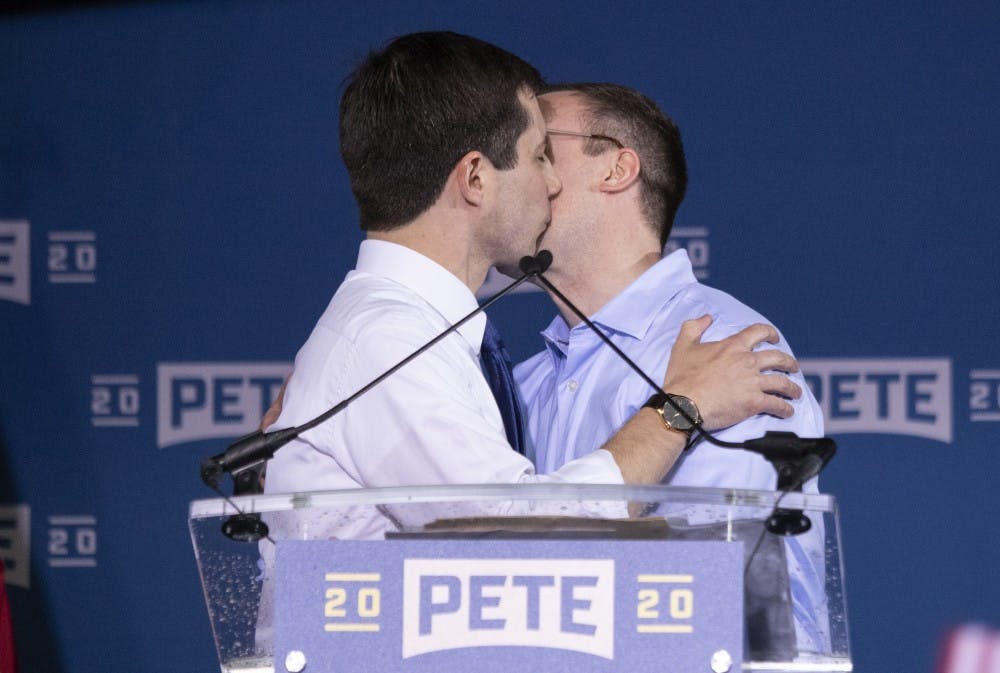A few months ago you would have been hard-pressed to find more than a passing mention of Pete Buttigieg in national news, let alone controversy about him that lasts more than a single news cycle.
Rush Limbaugh took aim at Buttigieg Feb. 12 for not being masculine enough to debate President Trump.
“A gay guy, 37 years old, loves kissing his husband on debate stages,” Limbaugh said on his radio show. “Can you see Trump have fun with that?”
But last week, Buttigieg had the opportunity to show Americans definitively that he would not sit quietly while the GOP attacked his identity. He even appeared on The Ellen DeGeneres Show last Friday to speak about the ridicule flying around conservative media.
While the magnitude might be different, the rhetoric itself is unsurprising. Since his campaign’s inception, Buttigieg has consistently been made to spend valuable time and energy defending his identity as a gay man. It detracts from his platform, and wastes time he could be spending defending his controversial stance among progressives on things such as health care and the Supreme Court.
Instead, Buttigieg has spent interview after interview convincing people his marriage and its interaction with his faith are valid enough to run in the U.S.
The attacks are an obvious strategy, bordering on boring. But derailing effective discourse in favor of mudslinging attacks pulls the narrative in a direction conservatives have a lot more control over.
And no one speaks for Republicans in this race quite like Limbaugh, who just received the Medal of Freedom from Donald Trump, the head of the Republican party.
Limbaugh expressed his belief that Democrats are in a panic because Buttigieg is a married gay man who has publicly kissed his husband. Limbaugh went on to claim that Buttigieg could never look masculine next to “Mr. Man Donald Trump.”
It took next to no time for Limbaugh’s comments to begin reverberating around right-wing circles. On his own radio show Feb. 12, Sebastian Gorka, a former deputy assistant to the president and a Trump campaign surrogate, questioned what right Buttigieg had to talk about abortion rights on the basis of his sexuality. The Federalist claimed Limbaugh’s claims weren’t homophobic.
And Bryan Fischer, host of "Focal Point" on American Family Radio, shared a slew of articles on Twitter outlining what a Buttigieg presidency would look like, everything from drag queen story time at the White House to the ridicule of what he calls the “dangerous transition pipeline,” a claim that liberals are encouraging their children to be transgender.
But here’s the real irony: most Americans don’t even care about a candidate's sexuality. In a Gallup poll conducted earlier this month, 78% of Americans said they would vote for a gay person to be president. The percentage of Americans willing to vote for a gay man was actually higher than the number who said they would vote for someone over 70 or a socialist. By those standards, Buttigieg comes out considerably less controversial than many of his counterparts.
Buttigieg responded to Limbaugh's comments in an interview with host Chris Wallace on Fox News Sunday, asserting he was “not going to be lectured on family values from the likes of Rush Limbaugh.” Buttigieg’s campaign has been straightforward about these kinds of attacks from its inception. Most of the time it doesn’t even bother to respond. However, the speed and vitriol that Limbaugh instigated seemed to trigger a real need to respond.
This is going to keep happening if Buttigieg continues to see success in the Democratic primaries, currently polling at 9.8% nationally. His more moderate platform and growing appeal to traditionally conservative voters makes him a real threat to Trump’s campaign because they can’t just label him a socialist and discard him.
Whether you’re a Buttigieg supporter or you’d rather see him turn his campaign bus around and drive right back to South Bend, Indiana, it’s important that progressives stand up to this rhetoric. Not believing in his policies is fine, as public discourse is vital to a strong democracy, but standing up for vulnerable groups is vital just the same. Buttigieg can take care of himself – there’s no question of him being capable of handling bullying.
As Buttigieg told the Washington Post, “All of us have to figure out how to find what’s in our identity and use it as a source of solidarity for others because anybody can be marginalized. And so many people right now are that if we don’t stick together, you never know who’s gonna be next.”
Ashley Sharpley (she/her) is a sophomore studying public policy analysis and business law. She is the proud owner of Echo the Gecko.





